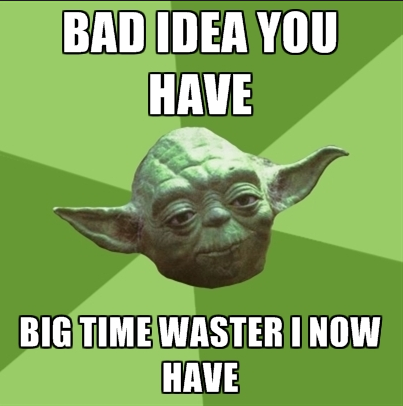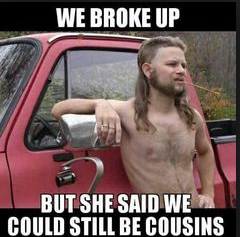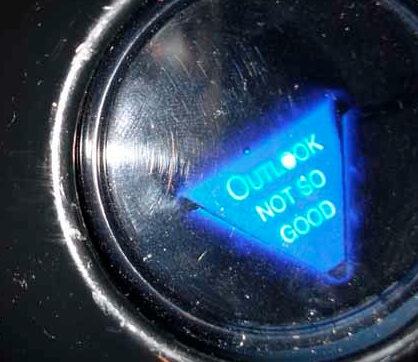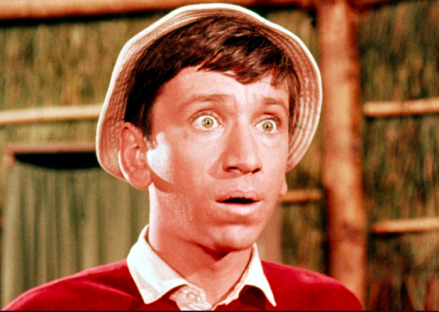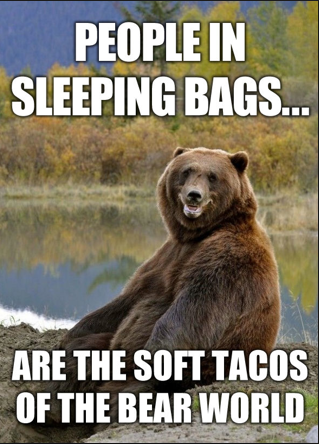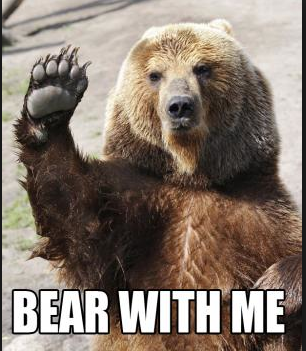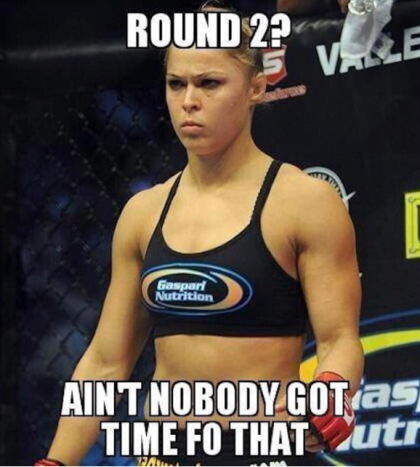Flawed Characters vs. Too Dumb to Live—What’s the Difference?
Just a quick reminder that I am running my log-line class again. Often synopses are a nightmare for writers simply because they cannot state simply what their story is about. If we don’t know what our story is about, then revisions are hell because it is virtually impossible to discern what should stay and what should be CUT. Everyone who signs up gets their plot shaved down to ONE sentence, so hope to see you guys there! Sign up HERE. The recording is included and if you can’t make the day of class, I will still repair your log-line ;) .
Moving on…
Which is more important? Plot or character? Though an interesting discussion—sort of like, Could Ronda Rousey take a Klingon with only her bare hands?—it isn’t really a useful discussion for anything other than fun. To write great fiction, we need both. Plot and characters work together. One arc drives the other much like one cog serves to turn another, thus generating momentum in the overall engine we call “STORY”.
If we goof up plot? Readers/Audiences get confused or call FOUL. Watch the movie Ouija for what I am talking about *shakes head*.
Goof up characters? No one cares about the plot.
New writers are particularly vulnerable to messing up characters. We drift too far to one end of the spectrum or the other—Super-Duper-Perfect versus Too Dumb to Live—and this can make a story fizzle because there is no way to create true dramatic tension. This leaves us (the frustrated author) to manufacture conflict and what we end up with is drama’s inbred cousin melodrama.
If characters are too perfect, too goody-goody and too well-adjusted? If they always make noble, good and professional decisions? Snooze fest.
Again. Bad decisions make great fiction.
Of course, the other side of that is what I call The Gilligan Effect. Yes, I am dating myself here and don’t want to upset ant DIE-HARD Gilligan’s Island fans, but I remember being a kid and this show nearly giving me an aneurism (being the highly logical child I was).
After the third time Gilligan botched up the escape off the island? Kristen would have gone Lord of the Flies and Piggy Gilligan would have mysteriously gone “missing.”
I also recall how the stranded party could make everything out of coconuts except a freaking BOAT, and the only reason I kept watching was because it was better than being locked outside to play in heat that returned asphalt back to a plasma state (Yay, Texas summers!).
Today we are going to talk about how we can make characters flawed without crossing over into TDTL (Too Dumb To Live) Territory. That and I SO had to blog about something that let me share THIS! *giggles*
Let’s hide behind the CHAINSAWS!!!! *clutches sides*
Okay, I’m back *giggles*.
Great stories are filled with characters making bad decisions, and when this is done well, we often don’t really notice it beyond the winding tension in our stomach, the clenching that can only be remedied by pressing forward and seeing if it works out okay. When characters are properly flawed, the audience remains captured in the fictive dream.
When we (the writer) goof up? The fictive dream is shattered. The audience is no longer part of the world because they’re too busy fuming that anyone could be that stupid. They also now cease to care about the character because, like Gilligan? They kind of want said TDTL character to die.
If this is our protagonist? Extra bad. Our protagonist should make mistakes, just not ones so egregious the reader stops rooting for him/her.
Bad Decisions Birthed from The Flaw
When we create a protagonist, we should remember that all strengths have a complimentary weakness. If a character has never been tested by fire, the protagonist is blind to the weakness.
For instance, great leaders can be control freaks. Loyal people can be overly naive. Compassionate people can be unrealistic. Y’all get the idea.
This dual nature of human strength paired with fallibility is why plot is just as critical.
The plot is the crucible that tests the mettle and reveals and fires out the flaw. The strength ultimately will have to be stronger than the weakness because this is how the protagonist will grow to become a hero by story’s end.
A great example of this is one of my favorite movies, The Edge. Anthony Hopkins plays billionaire Charles Morse. Charles is extremely successful and very much in his own head. Though he’s a genius, he lives the sheltered existence of the uber-wealthy.
What happens when all that “head-knowledge” is what he needs to survive a plane crash in the unforgiving wilderness?
When the plane crashes and he and the other two survivors make it to shore, Morse does the right thing. He knows they need to get dry before they all die from hypothermia. He also realizes Stephen, the photographer, is in full panic. What is the intelligent thing to do? Put the photographer to work doing something fruitful to take his mind off his fear.
The problem, however, is Morse assumes the photographer has the same knowledge-base and doesn’t take time to show Stephen how to use a knife properly and the man is badly injured. Now we’ve already had a problem (plane crash) and now we have a complication (bad injury) and then it gets worse.
Morse, again, being an in-his-own-head-guy and unaccustomed to having to communicate WHY he wants certain things done, tells Robert Green to bury the bloody fabric. Green is jealous of Morse and rebellious and instead of following instructions and burying the material? He hangs the blood-soaked rags from a tree where an incoming storm whips up the scent of an newly opened All You Can Eat Buffet.
Soon, the men are being hunted by an apex predator with the munchies for humans.
But all of this was birthed from a myriad of flaws. Morse failing to communicate and assuming his comrades are operating with the same head knowledge (because he’s never HAD to use this type of information in a real-world way) and also the two photographers who are City People and don’t have the sense to know 1) NOT to drag a knife towards the body and 2) that the smallest scent of blood will draw predators.
These men are used to the “civilized world” and at the beginning, have failed to properly appreciate that their position at the top of the food chain is NOT static.
Bad Decisions Depend on Circumstances
Sometimes characters will make bad decisions simply because this is a completely new world or a set of circumstances they’ve never faced, thus have no way to fully appreciate. The “bad” decision was not a “bad decision” before the adventure.
A good example? Merry and Pippin in The Lord of the Rings. In the Shire, people talk and are sociable. These naive characters haven’t yet felt the consequences of this new and dangerous world. To them? Chatting away and freely sharing information at The Prancing Pony is NOT a bad decision in their minds. Neither is frying bacon on top of a mountain.
They’ve always lived a life that if they were in a pub? They drank and made friends. If they wanted bacon? They just made bacon. They’ve never had to think beyond their mood or stomachs and don’t have the experience base to realize that fire is a “Come and Kill Me” beacon to the enemy.
Bad Decisions Can Be Birthed From The Wound

From the movie “Thelma & Louise”
We have talked about The Wound last time. In Thelma & Louise what is the wound? A lifetime of male oppression. In Thelma’s case, her husband controls every aspect of her life. Thus, when she finally does get on her own, she has poor judgement and is naive and that’s how she nearly ends up raped in a honky-tonk parking lot.
Louise was raped and no one was there for her. She’s been a victim and doesn’t trust men or the law. Thus, her baggage is what leads her to shoot Thelma’s attacker, but then also dovetails into the really, really bad decision to run.
But if we look at all these examples from an analytical distance, these characters are just DUMB. But why aren’t they TDTL? Context. Because of plot we (the audience) are not staring down at them like specimens through a microscope. We are immersed in their worlds and thus empathize with the bad decisions.
The bad decisions are forgivable because unless we live in the Alaskan wilderness? We can empathize with maybe doing something seriously stupid if we were stranded, too. We (the audience) have “been” to the Shire and know what world created the childlike Merry and Pippin. We appreciate they are grossly out of their depth and give them a pass.
In Thelma & Louise we can understand how damaged people make poor decisions because, unless we’ve been living under a rock, we’ve made similar choices, and suffered consequences created from fear not reason.
What this means is that, while ALL of these characters made really wrong decisions, they are necessary and pardonable decisions that serve to drive the character arc and thus the plot’s momentum.
That is the final note on characters making bad decisions. Do we have a character making a mistake, withholding vital information, acting irrationally because it is coming from a deeper place of flaws, circumstance or wounds?
Or, do we have a character playing marionette? Characters are making a mistakes because we NEED them to. The tension has fizzled, so let’s just let them do something epically stupid (and random)?
Audiences can tell the difference between mistakes that are organic and flow from deeper emotional waters versus something contrived. And we can ALL be guilty of forcing characters to make bad choices simply because we sense tension is missing. Even I have to go back and ask the tough question…WHY is this character doing this?
What are your thoughts regarding characters making poor decisions? What are some of your favorite examples? Ever quit a book, movie, or show because you wanted everyone to DIE? Did you hate Gilligan, too? Do you think Ronda Rousey could take on a Klingon with her bare hands?
I love hearing from you!
To prove it and show my love, for the month of AUGUST, everyone who leaves a comment I will put your name in a hat. If you comment and link back to my blog on your blog, you get your name in the hat twice. What do you win? The unvarnished truth from yours truly. I will pick a winner once a month and it will be a critique of the first 20 pages of your novel, or your query letter, or your synopsis (5 pages or less).
Note: I will announce July’s Winner next post :D .
For those who need help building a platform and keeping it SIMPLE, pick up a copy of my latest social media/branding book Rise of the Machines—Human Authors in a Digital World on AMAZON, iBooks, or Nook.



